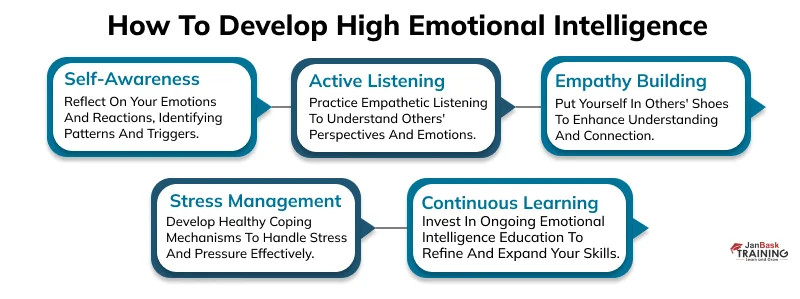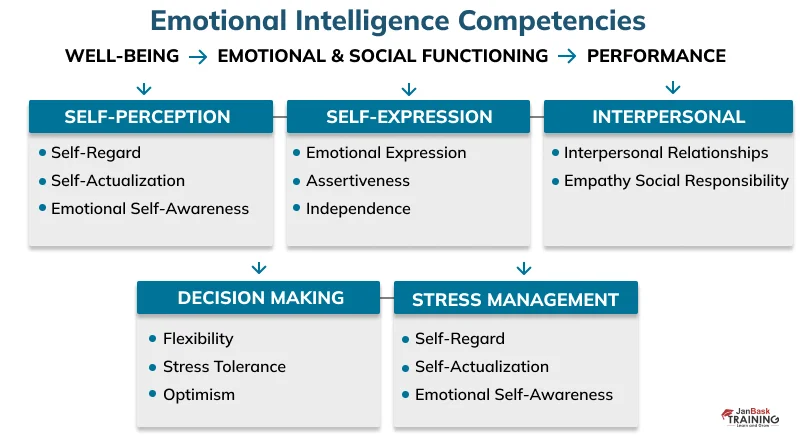Introduction
One crucial aspect due to which humans are still ruling over Artificial Intelligence in this present-day AI-driven world is Emotional Intelligence or EI. But what is Emotional Intelligence? Why is Emotional Intelligence Important? What does the Emotional Intelligence Definition explain? What are the skills that the industry demands for career growth and how proper artificial intelligence training online can help you elevate emotional intelligence that can be applied to real-world projects? Let’s unfold all these questions in this blog.
Note that robust technical skills and academic background can help you land a lucrative job. However, to survive, sustain, and become a leader, your emotional intellect takes precedence over your technical skill sets and expertise.
Take the example of the richest man in the world and one of the most successful CEOs, Jeff Bezos, whose success story hinges on Emotional Intelligence. Jeff Bezos showcases Emotional Intelligence primarily through the following:
- Acknowledge Challenges
- Remain Composed Under Pressure
- Surround yourself with smarter people
The founder of the e-commerce giant Amazon is at present worth $195.9B as per Forbes and is also ranked as the richest billionaire in the world. Jeff Bezos serves as a testament to the idea that ascending to leadership isn't solely about comprehending figures and generating profits. Let’s interpret the true emotionally intelligent meaning in this blog.
What Is Emotional Intelligence?
We, as human beings, are conditioned to have emotions that can be negative or positive. Some help us achieve success, and some can distract us from reaching our goals. However, the key is to master the art of channeling those emotions in the right direction. And successful leaders do it not only for themselves but for others as well. Suppose you are in a stage where you can comprehend, recognize, control, and influence your emotions as well as those of others. In that case, you are emotionally intelligent and you know what emotionally intelligent meaning is all about. So, what is emotional intelligence? Emotional Intelligence is a soft skill, an ability to relate to the emotions of others thus establishing a mental connection along with managing one's own emotions.
Why is emotional intelligence important? Individuals possessing a high level of EI can seamlessly navigate social interactions, form relationships, communicate with empathy, and even manage stress. If you think that the definition of emotional intelligence exclusively speaks about leadership skills, then you might be wrong. It is a personal as well as a professional skill. It is needed in all aspects of life, be it personal or professional. Mastering this skill can quickly lead you to leadership roles.
Simply put, a high level of EI makes you a better human being, a productive professional, and, eventually, an effective leader. Moreover, it helps to establish sustainable relationships with colleagues, clients, etc., and cultivate a congenial atmosphere at the workplace or in any other situation.
Now, let’s briefly talk about the history part. In 1990, researchers Peter Salovey and John Mayer introduced the term. However, it was later brought to fame by famous psychologist Daniel Goleman. It has been more than a decade since Goleman emphasized the significance of EI for leaders,

So if you dream of being a successful leader to the likes of Jeff Bezos, Elon Musk, or Indra Nooyi, who are all exemplary Emotionally intelligent leaders, you better start honing your EI skills. Start by understanding the emotional intelligence definition. Let’s share a secret: it is also a great tool to beat the rage of AI at present. All you need is an elevated level of EI and a certificate once you learn AI. Keep reading as we are going to talk about it in the upcoming
7 Elements Of Emotional Intelligence By Goleman
Well, apparently, the idea of the coexistence of two unlike terminologies, emotional and intelligence, might seem a little absurd. Because intelligence spurs from rationality, and emotionally driven people often tend to make wrong and impulsive decisions. However, Daniel Goleman, in his book Emotional Intelligence: Why It Can Matter More Than IQ, gave a new perspective to smartness, bringing these terms together. He gave a new angle to the human intellect through the emotional intelligence definition. He did that through the seven crucial elements of emotional intelligence, which are explained as follows:

1. Self-Awareness
This explains the foundation of what is emotional intelligence. Self-awareness is a quality that highlights our prowess and deficits to ourselves. This drives us to effectively handle situations and individuals with whom we interact, be it our colleagues, clients, subordinates, or friends and family. This is the first step to being empathetic. Once we are aware of our abilities, we can establish productive professional relationships, communicate effectively, better understand scenarios, maintain honesty, and set required boundaries. Self-awareness leads to effective communication that takes place when you start to comprehend others and cater to them authentically. Simply put, by being self-aware we can bring ourselves to a much better place where there is less stress, more satisfaction, and ultimately greater mental peace, which will altogether help you thrive not only professionally but personally as well.
2. Self-Management
Next comes self-management. The quality of self-management partly answers why is emotional intelligence important. It refers to being responsible for your own actions, your decisions, and your successes and failures. Self-management is all about judiciously planning your goals, developing strategies to achieve them, and tracking your progress constantly. At the same time, stay open to changes and new ideas focused toward your goal. And most crucially, rather than being the blamer, bear the brunt of your own failures. Being self-managed will shape you up to become a successful future leader. Being emotionally intelligent meaning taking charge of your own mistakes.
3. Self-Regulation
This is an integral part when it comes to answering what is emotional intelligence. Self-regulation is the process by which one can regulate and manage one's emotions and channel them in the right direction, encouraging productive outcomes.
4. Empathy
Empathy is basically a quality of understanding and feeling the emotions of others as if they are their own. A common attribute of empathetic and compassionate people is that they can easily connect to others by effectively understanding their pain points and feelings. An important skill for individuals in leadership and management roles. This cultivates relationships that hinge on mutual respect. This ability to comprehend the emotions of others helps them offer the right support, thus becoming a valuable asset to the organization as well as any community they belong to. This is why emotional intelligence is important in every aspect.
5. Social Skills
People with high emotional intelligence display social skills that reflect genuine care and respect for others, fostering positive and harmonious relationships. This also depicts why is emotional intelligence important everywhere.
6. Motivation
Individuals who possess high EI are often self-motivated people. Their optimistic and confident nature helps them stay resilient and consistent. Challenging times can hardly break their morale, which is why they always manage to find ways to overcome them and finally emerge as winners. Their consistent quest to become the best of their type helps them thrive in their endeavors and follows the emotional intelligence definition in true terms.
7. Relationship Management
Establishing and fostering amicable relationships with clients, partners, crucial stakeholders, etc., define your relationship management skills. If you excel at this, the results can be a surge in sales revenues, better customer loyalty and retention, and, of course, enhanced satisfaction levels. These contribute to faster achievement of organizational goals.
Hence, all these elements stated above collectively decide the level of EI one possesses and the true emotionally intelligent meaning. These attributes are interdependent on one another and together form an overarching emotionally intelligent individual. But how to measure how emotionally intelligent you are, and where do you stand on the EI scale? How can emotional intelligence help you? Let’s find out in the next section.
Measuring Your Emotional Intelligence
By now, you must have a clear idea of why is emotional intelligence important, and what emotional intelligence means in the workplace. It is needed for establishing effective communication with clients, working efficiently in a team, expertly handling challenging situations, and so on.
Top recruiters hunt for employees possessing a considerably high EI factor. They consider EI as a crucial KPI of employees.
However, the question is, how do they track it despite EI being an intangible quality? Well, we are going to tell you how. They do that with the help of advanced emotional intelligence tests.
Reuven Bar-On made the first test for Emotional Intelligence (EI), called the Emotional Quotient Inventory (EQ-i), after assessing several tests available now. Some tests can check different parts of EI. It's important to mention different parts because measuring emotional intelligence is easier said than done. All EI tests look at how someone is doing on a specific test right now. They measure what people do, not the potential that makes them do it. Some tests include, but are not limited to, the three popular tests: Self-reporting, other-reporting, and ability testing.

What is Self-Reporting?
Self-reporting is a form of psychometric testing that is similar to the personality tests many people take. While it's helpful to understand how candidates think of or assess themselves, there are still loopholes. A trustworthy method for estimating the inherent traits, similar to those found in personality tests, is the self-report testing process. People taking the test answer a questionnaire with 133 questions, and they rate each question on a scale from 1 to 5. So, self-reporting can be reliably used to measure Emotional Intelligence, but mainly in individuals who already have high Emotional Intelligence.
What is Other-Reporting Testing?
In this assessment, the EI of a person is measured based on the report of another person about him/her. Popularly referred to as observer rating, this helps to see how someone handles feelings compared to others and how he interprets the emotionally intelligent meaning. This report shows how other people perceive someone. However, this method has loopholes too, since to acquire authentic results from other-reporting, the feedback givers must also have a high EI as well and a good understanding of what is emotional intelligence; otherwise, it could be biased.
What is Ability Testing?
This is one of the most authentic methods of assessing EI. John Mayer and Peter Salovey, who coined the term emotional intelligence, created the first ability test for EI called the Multifactor Emotional Intelligence Scale (MEIS), consisting of 122 questions. This Emotional Intelligence ability test will clearly show how well someone can recognize, understand, and use emotions once they complete the test.
Also read, How to Get a Job With No Experience in Any Field? 10 Ways to Swear By!
Are These Tests on Emotional Intelligence Accurate?
As per Ian Florance, who is the director of ASE renowned for the Higgs-Dulewicz test (The Emotional Intelligence Questionnaire (EIQ), prepared by Prof Malcolm Higgs and Prof Victor Dulewicz), a practical test should be based on 100 years of evidence and have a manual to show that. According to him, if you take the test multiple times in the same conditions, your answers will be the same. However, to maintain accuracy, The British Psychological Society has laid some directives. Based on these guidelines, it is determined if a candidate is qualified to take the test. They only give it to people who have been trained to use it. However, some disputes regarding the accuracy still persist.
Signs That Show You Are Emotionally Intelligent
So, the assessments mentioned above are what recruiters will conduct. But how can you determine if you are emotionally intelligent? What is the emotional intelligence definition as per you? Let’s discuss some signs that you can look for in your traits.
- Are you an empathetic person and have the ability to understand others? Can you effectively communicate along with managing your own emotions?
- Can you handle disputes either at the workplace or in other personal situations, keeping your calm?
- Can you identify if someone is displeased or facing difficulties in articulating his/her thoughts or other emotions? Do you have the ability to support them and ease them out effectively?
- Do you prefer asking open-ended questions while you communicate with others?
- Do you have good social skills and prefer assertive communication with clear boundaries?
If you honestly answered all the above questions as Yes, then you are undisputedly an Emotionally Intelligent person who knows why is emotional intelligence important.

Distinguishing IQ From EQ
Both IQ, i.e., Intelligence Quotient and EQ or Emotional Quotient, are attributes of the intelligence of the human race. However, the difference lies in the skills they measure. IQ is known for gauging cognitive skills that comprise problem-solving, logical reasoning, and memory, whereas EQ measures emotional intelligence by the means mentioned above. Let’s see a detailed differentiation in the table below:
|
Aspect
|
IQ (Intelligence Quotient)
|
EQ (Emotional Quotient)
|
|
Definition
|
Measures cognitive abilities such as logical reasoning, problem-solving, and memory.
|
Assesses emotional intelligence, including understanding and managing emotions, interpersonal skills, and empathy.
|
|
Focus
|
Academic and analytical skills. Often associated with traditional intelligence.
|
Emotional understanding and expression, interpersonal effectiveness, and empathy. Critical for social situations and relationships.
|
|
Development
|
Generally considered stable throughout life.
|
Can be developed and enhanced through self-awareness, interpersonal experiences, and learning emotional skills.
|
|
Predictive Ability
|
Predicts academic success and certain aspects of career performance.
|
Predicts success in interpersonal relationships, leadership, and overall well-being.
|
|
Stability
|
Tends to remain relatively stable over time.
|
Can be developed and improved with conscious effort and experience.
|
|
Application
|
Important in academic and analytical settings.
|
Crucial for social situations, leadership, teamwork, and personal well-being.
|
|
Testing Methods
|
Standardized tests with a focus on cognitive abilities.
|
Often assessed through self-report measures, 360-degree feedback, and situational judgment tests.
|
|
Overall Contribution
|
Provides insights into cognitive strengths and weaknesses.
|
Offers insights into emotional self-awareness, social skills, and relationship management. Both contribute to a holistic understanding of an individual's capabilities.
|
How Emotional Intelligence Can Help You Thrive?
If you aspire to become a successful corporate professional, then you can’t avoid working with people. You must judiciously pave your way to success while effectively collaborating with your colleagues, subordinates, and, most crucially, managers, stakeholders, and clients. This is when your EI factor comes into play. Even 59% of recruiters will not hire someone with a high IQ but a low EQ. Take your case, for example. Would you prefer a highly intelligent robot as your friend or someone who perfectly understands your emotions and grievances and effectively addresses them every time? Think carefully and let us know in the comments section.
Do you know? As per talentsmarteq.com, people with high EQ make $29,000 more annually than people with low EQ. Not only that, linkedin says, over 80% to 90% of competencies that differentiate top performers from others are in the domain of Emotional Intelligence.
Therefore, a high level of Emotional Intelligence will undisputedly lead you to success.
- High EI helps maintain a positive work atmosphere. It enhances the abilities of every professional and helps them thrive.
- Staying calm under pressure is the key to success. Emotionally intelligent people are composed beings who have the ability to handle stressful situations expertly.
- As reported by people managers, Emotional Intelligence is most crucial in situations like leading change, giving effective feedback, addressing personal issues, and spotting talent, which, if done successfully, can lead you to success.
- Social skills, which is a prominent part of Emotional Intelligence, help conduct effective communications with clients and stakeholders, which contributes to increased sales.
- Emotional intelligence enables you to be mindful of both your own emotions and those of others, providing the opportunity to implement constructive adjustments.
- Reportedly, 90% of top performers have high EQ degrees, while 20% have high IQ degrees. Hence, it is evident from this stat that the higher your EI, the better you perform.
- A high EQ (emotional quotient) helps you excel in conflict resolution, promoting collaboration and teamwork that pave the way to success.
- There’s no success without challenges. EI helps you demonstrate resilience and a positive attitude in the face of challenges. Further, it helps you embrace change and remain flexible in evolving work environments.
- Most exemplary leaders are emotionally intelligent and have successfully created a positive work culture, where individuals feel valued, leading to increased productivity and job satisfaction.
Check out this empathetic post by Elon Musk:

Benefits Of Emotional Intelligence At Workplace
An entire workplace doesn't just comprise leaders; it is the team of employees that form the spine of any workplace. Hence, a harmonious workplace of emotionally intelligent employees streamlines the journey to overall success. So let’s tell you now why is emotional intelligence important in the workplace.
The following are some of the benefits of emotional intelligence in the workplace.
1. Enhanced Job Satisfaction:
Employees with high emotional intelligence tend to experience greater job satisfaction as they navigate workplace challenges with resilience and a positive outlook.
2. Improved and Effective Communication:
Emotional intelligence enhances communication skills, fostering clear and empathetic interactions among colleagues, and leading to a more collaborative and supportive work environment. Hence, knowing the emotionally intelligent meaning and becoming one garners great benefits.
3. Boost In Productivity and Performance:
Emotionally intelligent employees often exhibit higher levels of focus, motivation, and adaptability, contributing to increased overall performance and productivity within the workplace.
4. Less Conflict:
A workplace with emotionally intelligent individuals is characterized by reduced conflicts, as employees adept at managing emotions navigate disagreements more constructively, promoting a harmonious and cohesive team dynamic and staying organized at work.

Can AI Teach Us How To Become More Emotionally Intelligent?
Now let’s come to the most talked about topic. Well, directly, it’s a no; however, indirectly, Yes. This is because any kind of threat makes us more powerful to combat, more efficient to beat, and develop greater resilience and immunity to future threats. In the present scenario, considering the raving popularity of AI, no denying the fact that AI has grown to be the greatest competitor to the human race. There are ongoing debates on topics like whether AI is going to decrease job opportunities, etc.
However, the discussion on whether AI will take over human roles in the workforce typically simplifies into a dual explanation: AI is poised to substitute humans in routine tasks or tasks that demand manual labor, leaving humans to thrive in areas demanding soft skills such as creative communication and relationship-building which are essential parts of Emotional Intelligence.

Gong, a sales data analysis company, utilizes machine learning (ML) and natural language processing (NLP) to scrutinize sales interactions, enabling sales professionals to enhance communication and improve deal closures. Distinguishing itself from typical AI startups, Gong boasts a valuation of $7.25 billion and counts prestigious clients like Accenture, LinkedIn, Service Titan, Slack, PayPal, Zillow, among its extensive clientele.
Hence, get your AI certification online now. You can use an AI learning background to enhance your skill sets of emotional intelligence and other crucial interpersonal skills. AI can stand with you to boost your efficacy but can never stand opposite you as a threat.
As rightly said by executive coach and senior consultant Alicia D. Recee in her bestselling book Driven To Thrive, While AI brings advancements and efficiencies, it's essential to recognize that the human touch, the ability to connect on an emotional level, is not something that AI can replicate…yet. This is where emotional intelligence comes into play.
Indubitably, AI is unbeatable when it comes to data and algorithms. However, the emotional intelligence of humans, on the other hand, leverages empathy and effective analysis to decipher people’s emotions and nonverbal cues. This brings a distinct human touch to AI functions and applications. So, be emotionally intelligent and rule the world with an AI certification online in your arsenal.
Conclusion
Let’s conclude with one more interesting fact: A study at Google, which went over a decade, known as Project Oxygen, demonstrated that Emotional Intelligence is more significant for success in managerial roles rather than IQ or technical expertise. A high IQ can help you land a job, but a low EQ could cost you losing a job. Hence, treat this blog as your handbook and gear up for a thriving professional career ahead, but don’t forget to add some invaluable fuel to execute your journey to success.
Enroll in the cutting-edge Artificial Intelligence Training Online and Machine Learning online certification course from JanBask Training. With these certifications in your profile, be the unstoppable and unbeatable winner in your domain.
FAQs
Q. What Does Emotional Intelligence Mean?
Ans: Emotional Intelligence is a soft skill that involves understanding, managing, and influencing one's own emotions and the emotions of others. It plays a crucial role in effective communication, relationship building, and overall success in personal and professional life.
Q. Why Is Emotional Intelligence Important?
Ans: Emotional Intelligence is crucial as it enables individuals to navigate social complexities, form positive relationships, and communicate effectively. It plays a key role in leadership, teamwork, and overall well-being, making it an indispensable skill for success in various aspects of life.
Q. Can We Measure Emotional Intelligence?
Ans: Yes, Emotional Intelligence can be measured through advanced emotional intelligence tests such as the Emotional Quotient Inventory (EQ-i). These tests assess aspects like self-awareness, self-regulation, empathy, social skills, motivation, and relationship management.
Q. How Can Emotional Intelligence Help You?
Ans: Emotional Intelligence can benefit individuals in various ways. It helps develop self-awareness, allowing you to understand your emotions and reactions. This, in turn, enables effective self-management, fostering responsible decision-making and goal achievement. Emotional Intelligence also enhances interpersonal skills, facilitating better communication, conflict resolution, and relationship management. Additionally, it contributes to stress management, motivation, and overall well-being, empowering you to personally and professionally thrive.
Q. Can AI Contribute to Developing Emotional Intelligence?
Ans: While AI cannot directly develop Emotional Intelligence, it can indirectly assist by automating routine tasks, allowing humans to focus on soft skills. AI tools, like emotional intelligence tests and analysis, can provide insights and support individuals in enhancing their emotional intelligence skills.
Q. What Is the Difference Between IQ and Eq?
Ans: IQ measures cognitive abilities like problem-solving and logical reasoning, while EQ assesses emotional intelligence, including understanding and managing emotions, interpersonal skills, and empathy, which are crucial for social situations and relationships.
Artificial Intelligence Course
Upcoming Batches
Trending Courses
Cyber Security
- Introduction to cybersecurity
- Cryptography and Secure Communication
- Cloud Computing Architectural Framework
- Security Architectures and Models
Upcoming Class
6 days 22 Dec 2025
QA
- Introduction and Software Testing
- Software Test Life Cycle
- Automation Testing and API Testing
- Selenium framework development using Testing
Upcoming Class
2 days 18 Dec 2025
Salesforce
- Salesforce Configuration Introduction
- Security & Automation Process
- Sales & Service Cloud
- Apex Programming, SOQL & SOSL
Upcoming Class
1 day 17 Dec 2025
Business Analyst
- BA & Stakeholders Overview
- BPMN, Requirement Elicitation
- BA Tools & Design Documents
- Enterprise Analysis, Agile & Scrum
Upcoming Class
4 days 20 Dec 2025
MS SQL Server
- Introduction & Database Query
- Programming, Indexes & System Functions
- SSIS Package Development Procedures
- SSRS Report Design
Upcoming Class
10 days 26 Dec 2025
Data Science
- Data Science Introduction
- Hadoop and Spark Overview
- Python & Intro to R Programming
- Machine Learning
Upcoming Class
3 days 19 Dec 2025
DevOps
- Intro to DevOps
- GIT and Maven
- Jenkins & Ansible
- Docker and Cloud Computing
Upcoming Class
4 days 20 Dec 2025
Hadoop
- Architecture, HDFS & MapReduce
- Unix Shell & Apache Pig Installation
- HIVE Installation & User-Defined Functions
- SQOOP & Hbase Installation
Upcoming Class
3 days 19 Dec 2025
Python
- Features of Python
- Python Editors and IDEs
- Data types and Variables
- Python File Operation
Upcoming Class
18 days 03 Jan 2026
Artificial Intelligence
- Components of AI
- Categories of Machine Learning
- Recurrent Neural Networks
- Recurrent Neural Networks
Upcoming Class
11 days 27 Dec 2025
Machine Learning
- Introduction to Machine Learning & Python
- Machine Learning: Supervised Learning
- Machine Learning: Unsupervised Learning
Upcoming Class
24 days 09 Jan 2026
Tableau
- Introduction to Tableau Desktop
- Data Transformation Methods
- Configuring tableau server
- Integration with R & Hadoop
Upcoming Class
3 days 19 Dec 2025


























